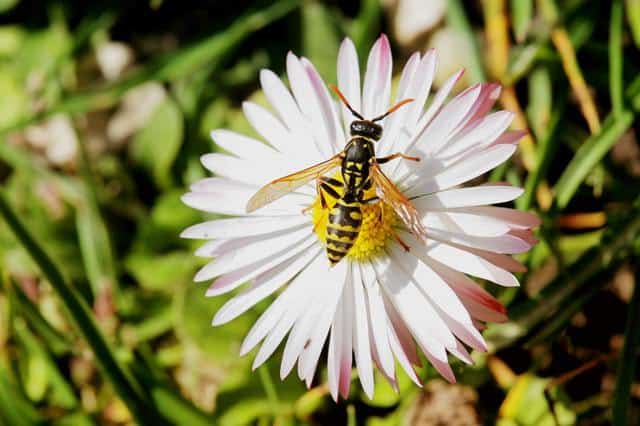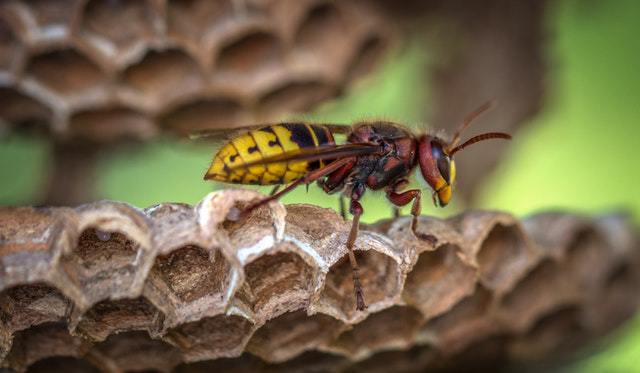If you are new to gardening, you must have wondered what are these yellow jackets. This article will not only introduce you to these creatures but will show you what they are for, too.
As the title suggests, some people wonder if they are actually beneficial. What are wasps good for? By the end of this reading, you will know for sure.
Have fun reading and be excited about your ongoing gardening experience!
Table of Contents
1. What Is A Yellow Jacket?
Yellow jackets are mostly considered pests. Most people even view them not just as common pests, but as major pests. They belong to the genera of insects called wasps.
Some yellow jackets are literally yellow and black, while other kinds of them are black and white. One thing that’s important to note about them is that all females are capable of stinging. Because of the stinging characteristic, sometimes they are mistaken for bees.
2. Are They Good For Your Garden?

The quick answer is yes. In fact, some gardeners consider them as welcome visitors. The main reason? Certain species help gardeners by feeding on caterpillars, aphids, flies, spiders, and garden pests. In other words, they can serve as “natural pesticides.”
Some species also eat dead meat, so they are useful for cleaning up any unsegregated waste meat. People call them meat bees for that reason. You just have to be sure these bees don’t come inside your home.
3. How Do You Begin Benefiting From Yellow Jackets?
Basically, you got to invite them into the garden. Usually, it visit gardens in late summer. In this time period, they will be looking for flower nectar. Since they love sweets, they can also swarm over the compost, if you’re not careful. If they find something sweet there, such as leftover fruit slices, they’re going to have a feast.
At this time, it raises their young in nests. You can allow some of these nests to stay in your garden. By doing so, you will already have made an effortless effort to attract visits from yellow jackets. With each visit, yellow jackets will be doing a pest-control service for you for free.
4. How Do You Avoid A Yellow Jacket Sting?
Perhaps most starting gardeners fear them because of its sting. With these wasps visiting your garden, you can arm yourself with a few habits to protect yourself.
- Firstly, you should leave no skin uncovered to minimize the risk. This includes your hands.
- Wear long sleeves and light gloves. The gloves will mainly be helpful if you have fruit trees.
- Loves sweet fruits, so if you’re cleaning up fruit plantations, you got to wear those gloves for optimum protection.
- When composting, you should cover a new layer with soil. Bury fruit waste at least two inches beneath.
Avoid a yellow jacket sting! Composting? You can set up a fruit compost yards away from home, so they’ll still have food attractors, but not immediately outside your home.
5. How Do You Get Rid Of It If They Thrive?
In case you observe their numbers rise to an uncontrollable level, you can regulate their presence by using a few traps. You may use a DIY-trap made of empty soda bottles. Sometimes, they can lurk on the patio. Place your traps around the area. Before winter begins, most of them will die of natural causes, so you won’t have further problems with trapping them.
On the other hand, commercial traps exist. You can buy them at a garden store. Whatever trap you use, be sure to empty and refresh them every few days. They won’t be as effective with prolonged use. Why? The reason is that yellow jackets don’t love a rotting smell. Dead yellow jackets in your traps will produce a rotting smell, thereby shooing away the live yellow jackets rather than attracting them. So, remember to refresh your traps.
Another technique in trapping yellow jackets for number control is placing the traps out of direct sunlight. Furthermore, the traps should sit in an open area where you don’t usually go.
6. What Are Some Of The Best Spraying Methods Of Control?
If you plan to spray insecticides, don’t do it merely at random. You may, however, spray directly on a nest of yellow jackets to kill it whole. Do this late night when the wasps are already home. Be sure to completely cover yourself before you do spray and be ready for a quick run.
Here’s another tip. Avoid using a flashlight when spraying. If you do, yellow jackets can quickly follow the light source and you will be in danger of getting a sting!
Keep in mind to spray the nest thoroughly. Look at the following guidelines.
- After spraying, do not remove the nest yet.
- Wait for a day or two and you will see the benefit.
In case you’re curious, here’s the reason why. Some yellow jackets forage overnight. When they return to their nest – and you’ve already sprayed it – they will die as they come in contact with the sprayed nest.
Take Advantage Of Yellow Jackets

Now that you’ve known what yellow jackets basically are and what they eat and do, you know what their use is for gardening. The quick answer to the question in the title is a big yes – there are real benefits in a garden. You just have to take advantage of their presence. Remember, though, that they do sting. So, when you come to visit the garden and you’re thriving with yellow jackets, prioritize your protection.
Also, when composting, take note of burying fruity leftovers in a layer of soil. This will minimize unnecessary battles with yellow jackets. When a number of them already thrive in your home garden, you may have to dismiss the idea of eating outside for some time. If their number goes up to seemingly uncontrollable levels, don’t hesitate to act on pest control. Visiting yellow jackets may have helped you control garden pests, but if they become a trouble to you, you got to prioritize minimizing your risks of getting stung, too.
